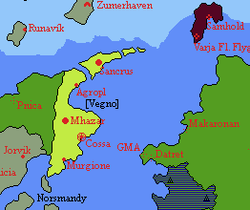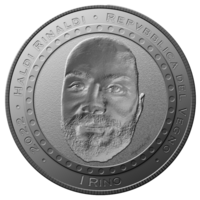Vegno
| Republic of Vegno | |||
| |||
| Motto: | |||
| Anthem: | |||

| |||
| Map versions | - | ||
| Capital | Cossa
(624.024 ab. /1705 AN) | ||
| Official language(s) | Vegnian (related to Gaian language) | ||
| Official religion(s) | |||
| Demonym | Vegnese | ||
| - Adjective | Vegnese | ||
| Government | Semi-Presidential Republic | ||
| - President | P. Antonio Visciglia | ||
| - Prime Minister | TBD | ||
| - Legislature | Assemblea Nazionale | ||
| Establishment | 1705 AN | ||
| Area | |||
| Population | 1 857 345 | ||
| Active population | 12 | ||
| Currency | Rino | ||
| Calendar | |||
| Time zone(s) | CMT +2 / +3 | ||
| Mains electricity | |||
| Driving side | |||
| Track gauge | |||
| National website | |||
| National forum | |||
| National animal | Cormorant | ||
| National food | Pizza | ||
| National drink | |||
| National tree | |||
| Abbreviation | VEG | ||
Vegno (/ˈveɲɲo/), officially the Republic of Vegno, is an independent nation in the northeast of Apollonia. Vegno declared its independence in 1705 AN as a semi-presidential republic with the simultaneous composition of a constituent assembly to draft the first Constitution of Vegno. The capital is located in the city of Cossa, overlooking the gulf of Cantor.
History
The Republic of Vegno was founded in 1705 AN with the drafting of the "Costituzione del Vegno" (Constitution of Vegno), signed by the seven members of the Constituent Assembly. Cossa was chosen as capital, since it was the largest city in Vegno, while the other big cities of Mhazar, Agropl, Murgione and Sancrus were named chief towns of their provinces.
The Constitution of the Republic of Vegno is the fundamental law of the State, which occupies the top of the hierarchy of sources in the legal system of the Republic: it is composed of 12 articles written and published in 12/1705 AN by the Seven Founding Fathers of the Constituent Assembly of Vegno.
The seven members of the constituent assembly are, provisionally, the most important offices of the Republic of Vegno, pending the appointment of an official President and a Prime Minister; these members are:
Salvatore "Shalva" Mancuso, Michelangelo Levati, "P." Antonio Visciglia, Luca "Lo Zar" Zarrella, Marco "M.M" Munno, Haldi Rinaldi "Pane" e Peppe "Freeda" Cantore.
The first general elections will be held in 1706 AN.
Etymology
According to the Vegnese Ministry of Culture, the term "Vegno" derives from gaian "Regno", whose meaning is kingdom.
This theory is supported by historical documents according to which the first settlers suffered from rhotacism. A well-known legend within the nation tells that the first settler who set foot off the coast of Cossa exclaimed: "Questo savà il nostvo Vegno!" ("This will be our kingdom!"), mispronouncing the term "Regno". Although the nation was configured over time as a republic, the name did not change.
The term was also associated with money, friendship and the welfare of the nation for unknown reasons.
Georaphy
Cities
The territories of Vegno are flat in their entirety and include three large cities (Cossa, Mhazar and Sancrus) and two small towns (Agropl and Murgione). A peculiarity of the nation is that it straddles one of the parallels of Micras; a part of its territories are in fact with CMT+2 (the cities of Murgione, Mhazar and Agropl), while the other part is CMT +3 (The capital Cossa and the city of Sancrus).
The western borders are towards the continent of Apollonia while the eastern part faces entirely the sea.
In the northern area of Vegno there are three islands of progressively smaller size, in the first of which there is the great city of Sancrus.
| City | Population |
|---|---|
| Cossa | 624 024 |
| Mhazar | 420 845 |
| Sancrus | 389 456 |
| Murgione | 53 298 |
| Agropl | 22 756 |
Cossa
Cossa is the capital city of Vegno. It is the most populous city in the nation and the seat of the main institutional bodies, such as the presidential palace, the seat of the government and the seat of the Assemblea Nazionale. The city has a large port and is served by the only intercontinental airport, the Aeroporto Internazionale di Cossa (VECO). Cossa is also the main financial, industrial, and cultural centre of Vegno, mainly due to its geographical position within the state.
The capital has a humid continental climate with mild, rainy summers and cold, snowy winters. Winters are cold, but mild for its latitude, owing to its coastal location. During the winters, temperatures tend to hover close to freezing and snowfall is common.
Mhazar
Mhazar is the second largest city of Vegno and also the second largest city in the central region. The city is especially known for its football tradition represented by the two official teams playing in the Campionato Vegnese di Calcio; the Mhacompare Arena is one of the newest stadiums built in Vegno and has already established a seat expansion.
As regards travelling, the main way to go in the other zone of Vegno is by train; the “Stazione Centrale di Mhazar” is where the so-called "FrecciaArancio" high-speed trains depart to all Vegno’s continental cities.
Sancrus
Sancrus is the largest city in the north. It is located on the island of Falange, the largest island in the northern archipelago.
The city has the most important fishing port of Vegno. Secondary to fishing, the University of Sancrus is a center for Arctic research. Many cultural activities take place in Teatro Casalnuovo, including concerts by the Vegnese National Orchestra and operas. Moreover, Sancrus is the seat of the Festival di Sancrus, officially the Vegnese Song Festival (vegnian: Festival della canzone vegnese), the most popular Vegnese song contest and awards ceremony. Aeroporto Sancrus-Falange "Stella del Nord" (VESF) is located in the city.
Sancrus experiences a boreal climate as winter temperatures are just cold enough to qualify and the summer season is short. However, precipitation amount and pattern, with maximum precipitation in autumn and winter, as well as lack of permafrost, are atypical for subarctic areas and more typical for oceanic climates. The snowfall pattern of the city is quite erratic and varies substantially between different winters.
Murgione
Murgione is the largest city in the south. It is located on the gulf of Peppozzo.
Agropl
Agropl is a small city in the north.
Agropl Is esteemed as the first settlement in the region, as the historical evidences point its original foundation to the first Vegnese communities. Unfortunately, the cold weather and internal government disagreements led to a progressive migration of the inhabitants to the Cossa and Sancrus regions. However the city still helds a strong position in the Vegnese cultural landscape, harboring the main archaelogical research center of the nation, the M&M Historical Fondation (MMHF), from the names of the two founders, Nicoshalva Mancusos and Peppemarcos Munno.
Politics
State Ordering
The Constitution of the Republic of Vegno, approved and promulgated by the Constituent Assembly (provisional highest office of the state) in 12/1705, is the fundamental law of the state.
Vegno is a Semi-Presidential Democratic Republic, in which the Parliament and the President of the Republic are the two istitution to hold the representation of the popular will.
The major institutions are:
- Parliament: consists of Assemblea Nazionale ("National Assembly"), exercises legislative power and votes for confidence in the Government.
- President of the Republic: he is the head of state and represents national unity; he is elected by the citizens according to the norms of the constitution and appoints the Prime Minister and, upon his proposal, the ministers. He can dissolve Parliament.
- The Government: exercises executive power, is composed of the Prime Minister and the ministers, who form the Council of Ministers.
- The Judiciary: exercises judicial power (both investigating and judging) and is independent from any other power, autonomous and governed by the Superior Council of the judiciary.
Elections
The first elections of the Republic of Vegno will be held in the year 1706 AN (March 2022), according to the modalities established by the Constitution.
Culture
Science
Space
Biology
Medicine
The Sistema Sanitario Vegnese (SSV) ("Vegnese National Health Service") is a universalistic public system which, as established by the Constitution of Vegno, guarantees the right to health and health care for all citizens, financed through general taxation and direct revenues, received by local health companies, deriving from health tickets (i.e. the shares with which the assisted contributes to the costs) and paid services.
Archeology
Geology
Tecnology
Sports
Football
Football is the most popular sport in Vegno and is regulated by the Federazione Calcistica del Vegno (FCV) ("Vegnese Football Federation").
The top series of the Vegno Football Federation is the Campionato Vegnese di Calcio ("Vegnese Football Championship") and will see its first edition in March 2022 (1706 AN) with the participation of 8 football clubs.
Cricket
Millitary
Economy
Currency
The Vegnese Rino is the official currency of Vegno.



